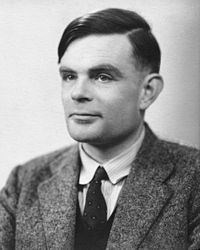If Alan Turing isn’t already the patron saint of gay geeks he should be. The British Turing was a cryptologist during War World II, conducting work crucial to the Allied effort to decode German messages, but it’s his pioneering contributions to early computing systems that really make Turing stand out. In 1946 Turing presented the first detailed plans for a stored-memory computer, creating the basic theory on which all modern computers are based. His innovations often outstripped the technology of his day. In 1948 Turing, working with a colleague, wrote the world’s first computer chess program, the only problem being that there wasn’t yet a machine powerful enough to run it. After his death, once computers became more powerful, the program was put into action and proved capable of beating amateur players.
Turing’s genius and skill didn’t save him from the institutionalized homophobia of his day, however. In 1952 his boyfriend broke into his house and robbed it. When Turing reported the crime to the police and explained his relationship to the perpetrator he was arrested and convicted under Britain’s laws prohibiting “homosexual acts.” The conviction led to Turing being stripped of his security clearance and barred from further government work.
The court gave Turing the choice of a prison sentence or chemical castration through estrogen injections. To avoid prison he agreed to the injections. Turing fell into a deep depression, partially attributable to the hormone imbalance caused by the injections. In 1952 his maid found him dead in bed, the victim of a self-inflicted cyanide overdose. The half eaten apple found on his nightstand fueled rumors that Turing administered the poison via the apple as an homage to the movie Snow White, but the apple was never tested. (Urban legend has it that Apple Computer’s logo, an apple with a bite taken out of it, is an homage to Turing.)
In preparation for the 100th anniversary of Turing’s birth in 2012 groups in the UK started a petition asking the government to issue a posthumous pardon to the war hero and pioneer last year. A similar effort in 2009 led to then Prime Minister Gordon Brown issuing an official apology for the British government’s treatment of Turing, but the pardon effort seems doomed to be unsuccessful. This week Britain’s Justice Minister, Lord McNally, issued a statement that Turing’s pardon would not be forthcoming:
“The question of granting a posthumous pardon to Mr Turing was considered by the previous Government in 2009… a posthumous pardon was not considered appropriate as Alan Turing was properly convicted of what at the time was a criminal offence. He would have known that his offence was against the law and that he would be prosecuted.
“It is tragic that Alan Turing was convicted of an offence which now seems both cruel and absurd -particularly poignant given his outstanding contribution to the war effort.”
…and so the conviction stays on the record, which I’m not sure is bad thing. LGBT people in Britain and around the world have been, and continue to be, the victims of officially-sanctioned discrimination. It’s important that that history be retained and presented along side our historic accomplishments. Rather than overshadowing Turing’s immense contributions to the world, the torture visited him by his government is a reminder of the oppressive environment in which he lived and worked.
Much more disturbing, to my mind, than the refusal of a posthumous pardon for Turing, is his absence from our cultural memory. We talk a lot about how “It Gets Better,” and about how queer young people need role models, but important LGBT historical figures like Turing are completely absent from Texas’ history books. Most students in our state will never be taught that the machines they use everyday owe their existence to a gay man. For that matter most adults, certainly not the ones behind websites full of hate and vitriol for LGBT people, know that without Turing there would be no blogging, Facebook or Youtube.
If you’re reading this I have to assume you use a computer at least some of the time. Please, take a moment right now to think of Alan Turing and the world he made possible, and the next time someone starts talking about the wonder’s of today’s technology make sure they know who to thank.














